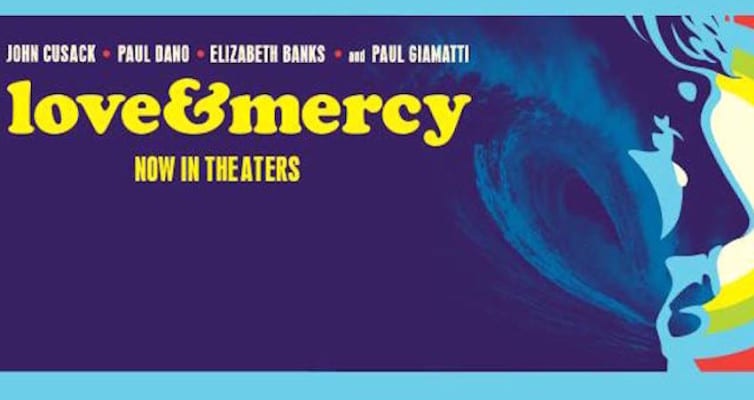LOVE & MERCY (PG-13)
![]()
If I were to assemble a list of the most important, influential songwriters of all time, the Beach Boys’ Brian Wilson would most likely make the cut. In Bill Pohlad’s new biopic “Love & Mercy,” we are not only given a glimpse into the musical genius that is Brian Wilson, but we also get an in depth look at Brian Wilson the man. And while there have been countless musician-based biopics in the past, Pohlad does something slightly unconventional here.
“Love & Mercy” delves into the musical beginnings of a young and brilliant Wilson (Paul Dano) as he strives to evolve as an artist even when father issues, inner band turmoil, and an unforseen sickness begin to take hold. What sets “Love & Mercy” apart is how it alternates between the early origins of Wilson’s career and that of his heavily medicated older self (John Cusack), a confused and trapped man who desperately wants be with the woman he loves (Elizabeth Banks) and to get out from under the control of a self serving doctor (Paul Giamatti, in a pefectly sleazy performance that rivals his turn as Pig Vomit in “Private Parts”).
Some will find the story structure here maddening, but I found it engrossing. I liked the contrast. But even those who don’t like the back and forth between time frames will find it difficult to deny the sheer power of the three lead performances in this picture. Dano does some of his best work here. He plays 1960s-era Wilson as a slightly awkward individual with an off-the-charts musical IQ at the height of his artistic creativity. This man doesn’t like to make music, he needs to. Dano not only captures the eccentric nature and joyful, musical spirit of this icon, but he also makes him human.
As the older version of Wilson, Cusack does his best work since 2007’s thriller, “1408.” Like Dano, Cusack captures the eccentric nature of this innovator, but he also expertly conveys Wilson’s pill-induced haze in the 1980s. While there’s certainly a sadness at the heart of this particular portrayal, that sadness makes way for happiness once Melinda Ledbetter (Banks) enters the picture.
Banks is positively outstanding as Ledbetter, a car saleswoman who would eventually go on to become Wilson’s second wife. This wonderful actress has a killer smile, but more importantly, she exudes warmth and compassion in a performance that simply lights up the screen.
Pohlad’s attention to detail is astonishing. This is an intimate, character-driven drama, but there is a great deal paid to authenticity. In particular, the Beach Boys recording session sequences are amazing, crackling with toe-tapping energy. It’ll be an absolute crime if this film isn’t nominated for Oscars in the sound arena. Beyond the technical attributes, Pohlad’s deft ability to put viewers inside Wilson’s head is quite an accomplishment in of itself.
“Love & Mercy” is fragmented to be sure. There are certainly aspects of Wilson’s life that are skimmed over and other significant portions that are left out entirely, but this is quite the epic life and to cover every aspect of it would be nearly impossible in a two-hour movie. What Pohlad does beautifully here is juxtapose two very different versions of the same man, making for a haunting, poetic, romantic tribute to a musical legend. It’s also a great love story. In fact, “Love & Mercy” goes a long way to suggest that if music gave Wilson a purpose in life, then it was Melinda Ledbetter’s love and compassion that saved it.
If you’re a Brian Wilson/Beach Boys fan, this movie is a must. But even if you’re not a fan (I doubt there are many of you out there), “Love & Mercy” is still well worth watching for Dano, Cusack, and Banks and for Pohlad’s meticulous eye for detail.




